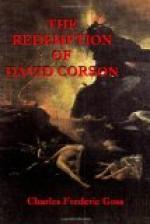The turn which had been given to the emotions of these quiet people by the reading of the parable had been so sudden and so powerful that perhaps not a single person in the room doubted that David and Pepeeta would at once rise and enter into that holy contract for which the way seemed to have been so easily opened by the tender story of the father’s love for the prodigal son.
But it was the unexpected which happened. The soul of David Corson had passed through one of those genuine and permanent revolutions which sometimes take place in the nature of man. He had completed the cycle of revolt and anarchy to which he had been condemned by his inheritance from a wild and profligate father. Whether that fever had run its natural course or whether as David himself believed, he had been rescued by an act of divine intervention, it is certain that the change was as actual as that which takes place when a grub becomes a butterfly. It was equally certain that from this time onward it was the mental and spiritual characteristics of his mother which manifested themselves in his spiritual evolution.
He became his true self—a saint, an ascetic, a mystic, a potential martyr.
When he rose to his feet a moment after the reader had finished, his face shining with an inward light and glowing with a sublime purpose, all believed that he was about to summon Pepeeta to their marriage.
What was the astonishment, then, when in rapt words he began:
“God has spoken to us, my friends. We have heard his voice. It is too soon for me to enjoy this bliss! Yes, I will wait! I will dedicate this year to meditation and prayer. Pepeeta, wilt thou join me in this resolution? If thou wilt, let the betrothal of this night be one of soul to soul and both our souls to God! Give me thine hand.”
Still under the spell of strange spiritual emotions to which her sensitive spirit vibrated like the strings of an AEolian harp, Pepeeta rose, and placing her hands in those of her lover, looked up into his face with a touching confidence, an almost adoring love. It was more like the bridal of two pure spirits than the betrothal of a man and woman!
Not one of those who saw it has ever forgotten that strange scene; it is a tradition in that community until this day. They felt, and well they might, those strange people who had dedicated themselves and their children to the divine life, that in this scene their little community had attained the zenith of its spiritual history.
No wonder that from an English statesman this eulogy was once wrung: “By God, sir, we cannot afford to persecute the Quakers! Their religion may be wrong, but the people who cling to an idea are the very people we want. If we must persecute—let us persecute the complacent!”
CHAPTER XXXIV.
FASTING IN THE WILDERNESS
“So great is the good I look for, that every hardship delights me.”




